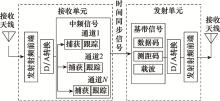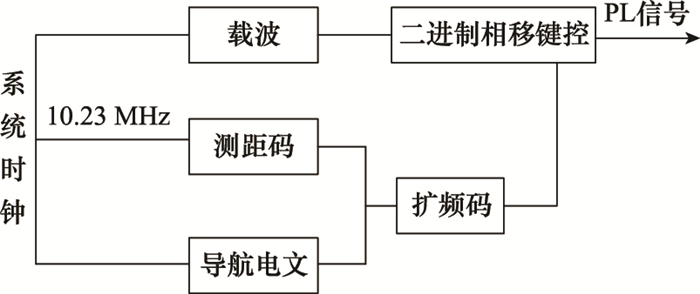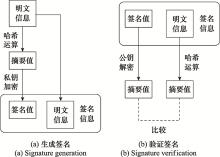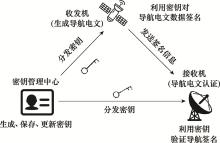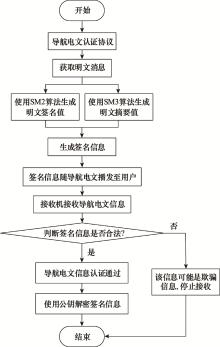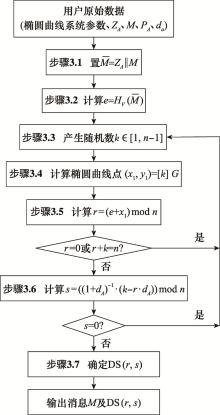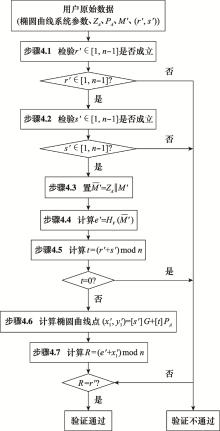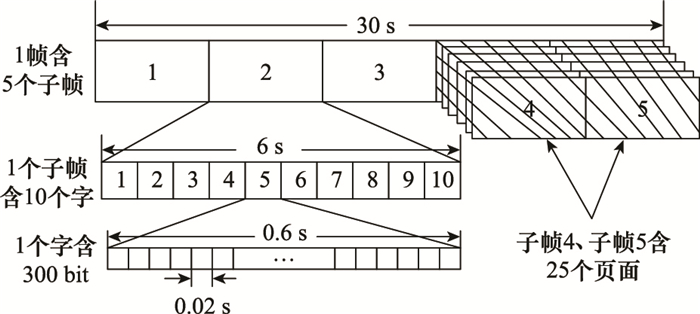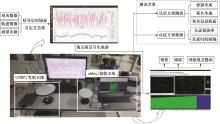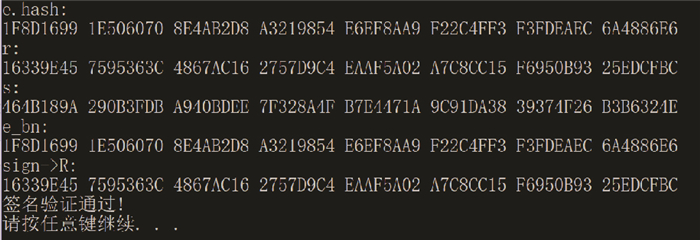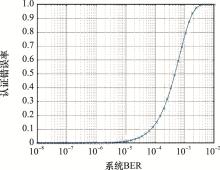Systems Engineering and Electronics ›› 2023, Vol. 45 ›› Issue (12): 4021-4029.doi: 10.12305/j.issn.1001-506X.2023.12.33
• Communications and Networks • Previous Articles
Research on pseudo satellite navigation signal authentication method based on national cryptographic algorithms
Siyuan CHEN1, Xiaohui BA1,2,3,*, Bogen CAI1,2,3, Wei JIANG1,2,3, Jian WANG1,2,3
- 1. School of Electronics and Information Engineering, Beijing Jiaotong University, Beijing 100044, China
2. State Key Laboratory of Rail Traffic Control and Safety, Beijing Jiaotong University, Beijing 100044, China
3. Beijing Engineering Research Center of EMC and GNSS Technology for Rail Transportation, Beijing 100044, China
-
Received:2022-08-16Online:2023-11-25Published:2023-12-05 -
Contact:Xiaohui BA
CLC Number:
Cite this article
Siyuan CHEN, Xiaohui BA, Bogen CAI, Wei JIANG, Jian WANG. Research on pseudo satellite navigation signal authentication method based on national cryptographic algorithms[J]. Systems Engineering and Electronics, 2023, 45(12): 4021-4029.
share this article
Table 3
Signature information's arrangement and distribution"
| 签名值位置 | 导航电文预留位 |
| 1-128 | 子帧4, 第21页面, 第91-114、121-144、151-174、181-204、211-234、271-278位 |
| 129-256 | 子帧4, 第22页面, 第91-114、121-144、151-174、181-204、211-234、271-278位 |
| 257-384 | 子帧4, 第23页面, 第91-114、121-144、151-174、181-204、211-234、271-278位 |
| 385-512 | 子帧4, 第24页面, 第91-114、121-144、151-174、181-204、211-234、271-278位 |
Table 4
Parameter information of elliptic curve"
| 参数名称 | 英文表示 | 内容设置 |
| 素数 | p | FFFFFFFE FFFFFFFF FFFFFFFF FFFFFFFF FFFFFFFF 00000000 FFFFFFFF FFFFFFFF |
| 曲线参数1 | a | FFFFFFFE FFFFFFFF FFFFFFFF FFFFFFFF FFFFFFFF 00000000 FFFFFFFF FFFFFFFC |
| 曲线参数2 | b | 28E9FA9E 9D9F5E34 4D5A9E4B CF6509A7 F39789F5 15AB8F92 DDBCBD41 4D940E93 |
| 基点坐标 | xG | 32C4AE2C 1F198119 5F990446 6A39C994 8FE30BBF F2660BE1 715A4589 334C74C7 |
| 基点坐标 | yG | BC3736A2 F4F6779C 59BDCEE3 6B692153 D0A9877C C62A4740 02DF32E5 2139F0A0 |
| 基点阶段 | n | FFFFFFFE FFFFFFFF FFFFFFFF FFFFFFFF 7203DF6B 21C6052B 53BBF409 39D54123 |
Table 5
Key generation information in each phase"
| 密钥种类 | 结果 |
| SM2私钥d | 128B2FA8 BD433C6C 068C8D80 3DFF7979 2A519A55 171B1B65 0C23661D 15897263 |
| SM2公钥x | D5548C78 25CBB561 50A3506C D57464AF 8A1AE051 9DFAF3C5 8221DC81 0CAF28DD |
| SM2公钥y | 92107376 8FE3D59C E54E79A4 9445CF73 FED23086 53702726 4D168946 D479533E |
| 1 | 宁津生, 姚宜斌, 张小红. 全球导航卫星系统发展综述[J]. 导航定位学报, 2013, (1): 3- 8. |
| NING J S , YAO Y B , ZHANG X H . Review of the development of global satellite navigation system[J]. Journal of Navigation and Positioning, 2013, (1): 3- 8. | |
| 2 | TSUI J . Fundamentals of global positioning system receivers: a software approach[M]. 2 ed New York: Wiley, 2004. |
| 3 | CHOI I K, WANG J L, HAN S W, et al. Pseudolites-a new tool for surveyors[C]//Proc. of the 2nd Trans Tasman Surveyors Conference, 2000: 20-26. |
| 4 |
SO H , LEE T , JEON S , et al. Implementation of a vector-based tracking loop receiver in a pseudolite navigation system[J]. Sensors, 2010, 10 (7): 6324- 6346.
doi: 10.3390/s100706324 |
| 5 | CAPARRA G, WULLEMS C, IOANNIDES R T. An autonomous GNSS anti-spoofing technique[C]//Proc. of the Satellite Navigation Technologies & European Workshop on GNSS Signals & Signal Processing, 2017. |
| 6 | 申成良, 郭承军. 卫星导航信号电文加密技术研究与评估[J]. 全球定位系统, 2018, 43 (3): 7- 12. |
| SHEN C L , GUO C J . Study and evaluation of GNSS signal cryptographic authentication defenses[J]. GNSS World of China, 2018, 43 (3): 7- 12. | |
| 7 | 黄龙, 唐小妹, 王飞雪. 卫星导航接收机抗欺骗干扰方法研究[J]. 武汉大学学报(信息科学版), 2011, 36 (11): 1344- 1347. |
| HUANG L , TANG X M , WANG F X . Anti-spoofing techniques for GNSS receiver[J]. Geomatics and Information Science of Wuhan University, 2011, 36 (11): 1344- 1347. | |
| 8 | CHINO K, MANANDHAR D, SHIBASAKI R. Authentication technology using QZSS[C]//Proc. of the IEEE/ION Position, Location and Navigation Symposium, 2014. |
| 9 |
WESSON K D , ROTHLISBERGER M P , HUMPHREYS T . Practical cryptographic civil GPS signal authentication[J]. NAVIGATION: Journal of the Institute of Navigation, 2012, 59 (3): 177- 193.
doi: 10.1002/navi.14 |
| 10 | WESSON K D, ROTHLISBERGER M P, HUMPHREYS T E. A proposed navigation message authentication implementation for civil GPS anti-spoofing[C]//Proc. of the 24th International Technical Meeting of the Satellite Division of the Institute of Navigation, 2011. |
| 11 |
WESSON K D , GROSS J N , HUMPHREYS T E , et al. GNSS signal authentication via power and distortion monitoring[J]. IEEE Trans.on Aerospace and Electronic Systems, 2018, 54 (2): 739- 754.
doi: 10.1109/TAES.2017.2765258 |
| 12 | KERNS A J, WESSON K D, HUMPHREYS T E. A blueprint for civil GPS navigation message authentication[C]//Proc. of the Position, Location & Navigation Symposium, 2014. |
| 13 |
FERNANDEZ-HERNANDEZ I , RIJMEN V , SECO-GRANADOS G , et al. A navigation message authentication proposal for the Galileo open service[J]. Navigation, 2016, 63 (1): 85- 102.
doi: 10.1002/navi.125 |
| 14 | MOTELLA B, MARGARIA D, PAONNI M. SNAP: An authentication concept for the Galileo open service[C]//Proc. of the IEEE/ION Position, Location and Navigation Symposium, 2018. |
| 15 | FERNANDEZ-HERNANDEZ I, RIJMEN V, SECO-GRANADOS G, et al. Design drivers, solutions and robustness assessment of navigation message authentication for the Galileo open service[C]//Proc. of the 27th International Technical Meeting of the Satellite Division of the Institute of Navigation, 2014: 2810-2827. |
| 16 | 唐超, 孙希延, 纪元法, 等. GNSS民用导航电文加密认证技术研究[J]. 计算机仿真, 2015, 32 (9): 86-90, 108. |
| TANG C , SUN X Y , JI Y F , et al. Research on GNSS civil navigation message encryption and authentication technology[J]. Computer Simulation, 2015, 32 (9): 86-90, 108. | |
| 17 |
王宏伟, 张爽娜, 魏婵娟. 民用导航信号电文加密技术综述[J]. 现代导航, 2017, 8 (4): 243- 248.
doi: 10.3969/j.issn.1674-7976.2017.04.003 |
|
WANG H W , ZHANG S N , WEI C J . Review of civil navigation message authentication technology[J]. Modern Navigation, 2017, 8 (4): 243- 248.
doi: 10.3969/j.issn.1674-7976.2017.04.003 |
|
| 18 | YUAN M Z, LYU Z, CHEN H, et al. An implementation of navigation message authentication with reserved bits for civil BDS anti-spoofing[C]//Proc. of the China Satellite Navigation Conference, 2017. |
| 19 | 袁木子. 卫星导航信号电文防伪设计[D]. 长沙: 国防科学技术大学, 2017. |
| YUAN M Z. Design of navigation message authentication for GNSS services[D]. Changsha: National University of Defense Technology, 2017. | |
| 20 | 刘宇航, 蔡伯根, 巴晓辉. 基于伪卫星的导航系统定位方法研究[C]//第12届中国卫星导航年会, 2021: 110-116. |
| LIU Y H, CAI B G, BA X H. Research on positioning method based on pseudolite navigation system[C]//Proc. of the China Satellite Navigation Conference, 2021: 110-116. | |
| 21 | 王亚宾, 战兴群, 徐洪亮, 等. 伪卫星室内导航定位系统研究和设计[J]. 计算机测量与控制, 2012, 20 (3): 793- 796. |
| WANG Y B , ZHAN X Q , XU H L , et al. Research and design of pseudolite in-door positioning navigation system[J]. Computer Measurement & Control, 2012, 20 (3): 793- 796. | |
| 22 | 边少锋, 胡彦逢, 纪兵. GNSS欺骗防护技术国内外研究现状及展望[J]. 中国科学: 信息科学, 2017, 47 (3): 275- 287. |
| BIAN S F , HU Y F , JI B . Research status and prospect of GNSS anti-spoofing technology[J]. SCIENTIA SINICA Informationis, 2017, 47 (3): 275- 287. | |
| 23 | CAPARRA G, CURRAN J T. On the achievable equivalent security of GNSS ranging code encryption[C]// Proc. of the IEEE/ION Position Location & Navigation Symposium, 2018: 956-966. |
| 24 | MU S L , CHEN Y , LIU T , et al. Design of message authentication and OTAR broadcast strategy for BDSBAS[J]. Journal of Beijing University of Aeronautics and Astronautics, 2021, 47 (7): 1453- 1461. |
| 25 | 谢宗晓, 李达, 马春旺. 国产商用密码算法SM2及其相关标准介绍[J]. 中国质量与标准导报, 2021, (1): 9-11, 22. |
| XIE Z X , LI D , MA C W . Domestic commercial cryptographic algorithm SM2 and standards introduction[J]. China Quality and Standards Review, 2021, (1): 9-11, 22. | |
| 26 | 谢宗晓, 甄杰, 董坤祥. 国产商用密码算法SM3及其相关标准介绍[J]. 中国质量与标准导报, 2021, (3): 14- 16. |
| XIE Z X , ZHEN J , DONG K X . Domestic commercial cryptographic algorithm SM3 and standards introduction[J]. China Quality and Standards Review, 2021, (3): 14- 16. | |
| 27 | 谢宗晓, 董坤祥, 甄杰. 国产商用对称密码算法及其相关标准介绍[J]. 中国质量与标准导报, 2021, (4): 14- 16. |
| XIE Z X , DONG K X , ZHEN J . Domestic commercial symmetric cryptography algorithm and standards introduction[J]. China Quality and Standards Review, 2021, (4): 14- 16. | |
| 28 | WU Z J , LIU Y , CAO H . ECDSA-based message authentication scheme for BeiDou-Ⅱ navigation satellite system[J]. IEEE Trans.on Aerospace and Electronic Systems, 2019, 55 (4): 1666- 1682. |
| 29 | GB/T 32918.2—2016. SM2椭圆曲线签名算法第二部分: 数字签名算法[S]. 北京: 中国标准出版社, 2017. |
| GB/T 32905—2016. Cryptographic algorithm SM2 based on elliptic curves Part 2: Digital signature algorithm[S]. Beijing: Standards Press of China, 2017. | |
| 30 | GB/T 32905—2016. SM3密码杂凑算法[S]. 北京: 中国标准出版社, 2017. |
| GB/T 32905—2016. SM3 cryptographic Hash algorithm[S]. Beijing: Standards Press of China, 2017. | |
| 31 | WU Z J , ZHANG Y , LIU R . BD-Ⅱ NMA&SSI: an scheme of anti-spoofing and open BeiDou Ⅱ D2 navigation message authentication[J]. IEEE Access, 2020, 8, 23759- 23775. |
| [1] | Luning YANG, Zhenghua LIU, Nuan WEN. Integrated navigation trajectory prediction method based on deep Gaussian process for multiple unknown environments [J]. Systems Engineering and Electronics, 2023, 45(11): 3632-3639. |
| [2] | Kaidi JIN, Hongzhou CHAI, Chuhan SU, Minzhi XIANG, Ming LI. State transformation Kalman filter for DVL/SINS integral navigation system [J]. Systems Engineering and Electronics, 2023, 45(11): 3624-3631. |
| [3] | Qiuying WANG, Kaiyue LIU, Juan YIN. Research on error estimation of micro-gyroscope and location method based on BPNN for vehicle during GNSS outages [J]. Systems Engineering and Electronics, 2020, 42(5): 1139-1145. |
| Viewed | ||||||
|
Full text |
|
|||||
|
Abstract |
|
|||||
